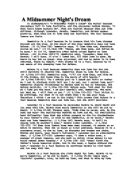How does Shakespeare use love to create drama and interest in 'A Midsummer Night's Dream?'
How does Shakespeare use love to create drama and interest in ‘A Midsummer Night’s Dream?’ By Mahmoud Elsherif
‘A Midsummer Night’s Dream’ is a very dramatic play because it involves many qualities such as: tension, excitement, suspense, misery, comedy, violence, grief, contrast and conflict. The lovers are: Lysander, Hermia, Helena, Demetrius, Theseus, Hippolyta, Oberon, Titania, Pyramus and Thisbe. Some people are kind-hearted such as Lysander, Hermia, Helena, Hippolyta, Titania, Pyramus and Thisbe because they care about other people’s feelings and they keep their promises such as Titania. Other people are heartless such as Demetrius, Theseus and Oberon because they only care about themselves. The different types of love are: idealistic, romantic, magical, physical, sexual and lustful, comic aspects of love and marital love. Love can be a beautiful emotion but can be an ugly one as well and it can also be ironic because it can cause chaos with arguments and sometimes it can prevent or bring order. In my opinion, some men think of romantic love as a pathetic and weak emotion, because they think it has nothing good with it and some of them care more about chaos, horror and violence such as Demetrius. Some women think that love is the most important thing in human life such as Helena. The main idea to ‘A Midsummer Night’s Dream’ is that love is blind: ‘“Love looks not with the eye, but with the mind.”’ Love can be confusing, love is fickle and love can be destructive to the human heart. Another idea could be love does not always run smoothly: ‘“The course of true love never did run smooth.”’ Shakespeare suggests we should learn from love’s mistakes and mend them, making it run smoothly as a well-oiled machine.
Theseus the Duke of Athens and Hippolyta the Queen of the Amazons shows marital love because Theseus can’t wait for the wedding and his marriage to Hippolyta he is like a child because he is excited: ‘“Now, fair Hippolyta, our nuptial hour Draws on apace; four happy days bring in Another moon- but O, methinks, how slow This old moon wanes.”’ But Hippolyta is being patient and she can wait for her celebrations with Theseus ‘“Four days will quickly steep themselves in night; Four nights will quickly dream away the time; And then the moon, like to a silver bow New bent in heavens, shall behold the night Of our solemnities.”’ The audience will understand Theseus because some people love their wedding day and their marriage, while other people are patient for their wedding celebration and their marriage This proves the theory of love being the most powerful force, In this play some characters give impression of being enemies to one another but in the end they become friends or married couples: ‘“Hippolyta, I woo’d thee with my sword.”’ Theseus is very harsh to Hermia because he tells Hermia to go with her father’s judgement, to die or go to a nunnery: ‘“Either to die the death, or to abjure For even society of men.”’ Some of the audience will start hating Theseus and might be thinking, what a horrible man or some of the audience will start liking him because they may think he is right the children should obey their parents and never question them; In their quarrel, Oberon and Titania tell us this is not the first relationship for either Hippolyta or Theseus. Not only has Theseus’ name been linked with Titania’s, but he has supposedly ravished and deserted Perigouna, Ariadne, and Antiope, among others. Similarly, Hippolyta has been the “buskin’d mistress” of Oberon and has spent time with Hercules and Cadmus: ‘“ I was with Hercules and Cadmus once,”’ And: ‘“ Knowing I know thy love for Theseus? Didst not thou lead him through the glimmering night From Perigenia, whom he ravished, And makes him with fair Aegles break his faith, With Ariadne, and Antiopa?”’ Later on with the play, Theseus starts to become more caring to the lovers ‘“Fair lovers, you are fortunately met…These couples shall eternally be knit.”’ Now the audience will start respecting Theseus because he disobeyed the law and Egeus just for love and now he knows the meaning of true love because he found it in the four main lovers.








